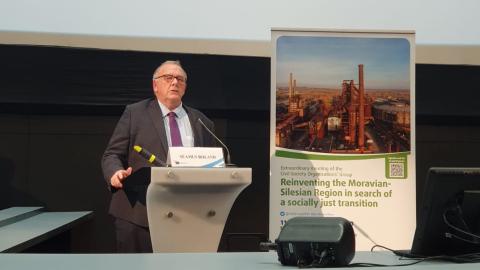European Economic
and Social Committee
There will be no just transition to low-carbon societies without civil society involvement
Academia, local civil society organisations, representatives of regional and national authorities and members of the European Economic and Social Committee (EESC) met at a conference in Dolni Vítkovice, a former industrial area for coal mining and steel production in Ostrava, on 11 October 2022. The conference on Reinventing the Moravian-Silesian Region in search of a socially just transition was organised by the EESC's Civil Society Organisations' Group as part of the Czech Presidency of the Council of the EU.
Opening the conference, Séamus Boland, President of the EESC's Civil Society Organisations' Group, stressed the need and urgency for a just transition to climate neutral economies and for civil society actors to ensure that nobody was left behind. He said: The European Green Deal and the EU digital transition are inter-dependent and central to the EU's strategy of geostrategic autonomy from Russia. But we need to shrink this big strategic vision of the EU to the local level. Because nothing will be achieved without getting on board local communities and civil society organisations. We must directly involve them in bottom-up processes, jointly developing creative and sustainable solutions for a sustainable future.
Mr Boland recognised the significant efforts made in the Moravian-Silesian region to transform itself to a sustainable and low-carbon region. He also emphasised the identity challenge stemming from the transformation of the steel heart of the Czech Republic into a low carbon economy. The process would clearly entail a reinvention of the local identity.
EESC president Christa Schweng suggested sharing knowledge across industries and sectors and learning from examples such as the Moravian-Silesian region: We need to incentivise sharing of good practice and experiences in successful just transitions.
Ms Schweng stressed the need to provide adequate answers to the impact of the transformation process on people and businesses, particularly SMEs, and especially in the context of current crises. Societies and businesses needed a green transition at a pace they were able to follow.
Anna Hubáčková, Minister for the Environment of the Czech Republic, said that the just transition should be a gradual step-by step process during which the States create just conditions. The transformation of coal mining regions is one of the big challenges of the Czech Republic and elsewhere. We realise the social aspects, especially in the most vulnerable regions, including the Moravian-Silesian region. The green and digital transition must not mean another blow to the region. It must be an opportunity and a challenge.
We would need to look into solutions for how to retain people in the region, how to create jobs for them and how to change the industrial structure. The new just transition programme could help to address these issues.
Discussions focused on the economic, social and environmental factors of the transformation process. Participants considered identifying specific and targeted actions, such as adapted life-long learning, re-training and upskilling opportunities as key elements. Substantial long-term investment in the education sector and in economic diversification would also be of crucial importance.
The role of funding for small projects and social services, synergies and the development of infrastructure (such as high-speed internet) for innovation, development and social cohesion, was highlighted. Purely economic instruments could not guarantee a fully successful transition, in view of demographic challenges for instance.
Vladimír Špidla, director of Masaryk Democratic Academy, former Prime Minister of the Czech Republic and former European Commissioner, also spoke about the social dimension of the transition process. He said: Any restructuring of a large region is a major undertaking, often fraught with conflict. Its success often depends on our capacity for dialogue.
Lukáš Curylo, Deputy Governor of the Moravian-Silesian Region and member of the CSO Group, closed the conference by underlining: The transformation is multidisciplinary. It concerns industry, environment and social aspects as well as social dialogue and non-profit organisations and their role in this process. Across Europe we have similar problems and we need to address them together.
The conclusions and recommendations of the conference will be published on the event page shortly.
Work organisation
Downloads
-
PR - There will be no just transition to low-carbon societies without civil society involvement
-
TZ - Spravedlivý přechod na nízkouhlíkovou společnost není možný bez účasti občanské společnosti
